新课标 Unit 7 International Charities Grammar. 课件(牛津译林八年级下册)
文档属性
| 名称 | 新课标 Unit 7 International Charities Grammar. 课件(牛津译林八年级下册) |  | |
| 格式 | zip | ||
| 文件大小 | 3.5MB | ||
| 资源类型 | 试卷 | ||
| 版本资源 | 牛津译林版 | ||
| 科目 | 英语 | ||
| 更新时间 | 2023-04-23 15:07:03 | ||
图片预览

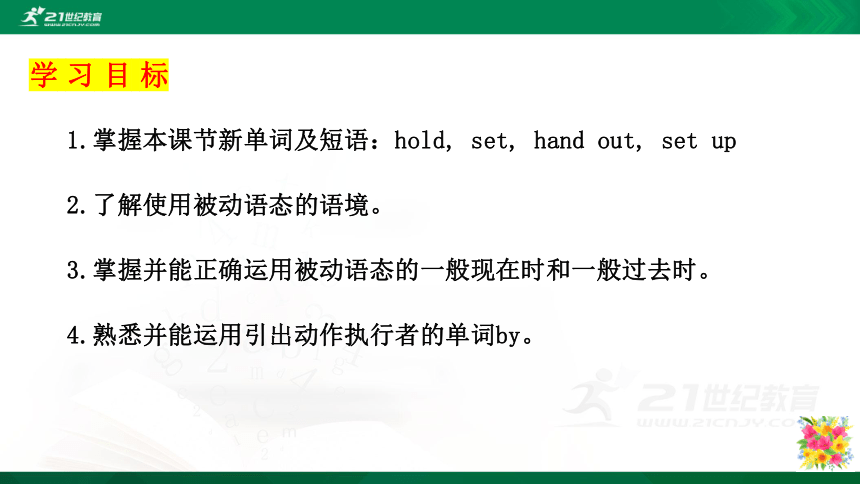

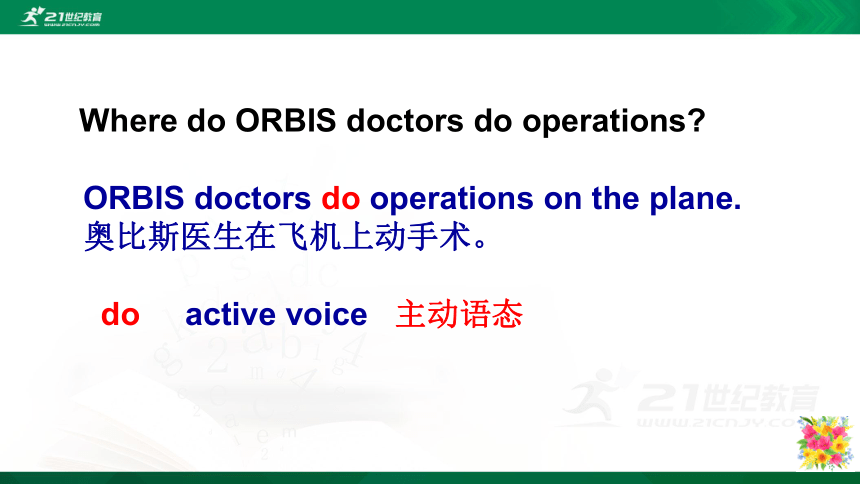
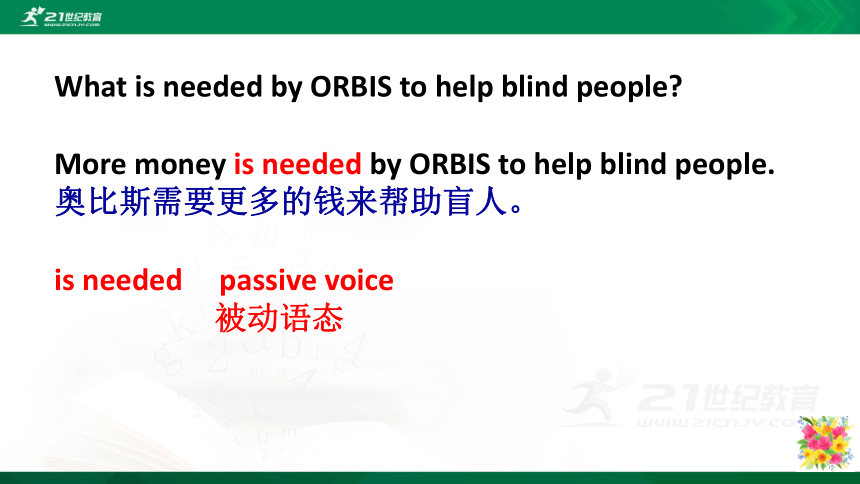

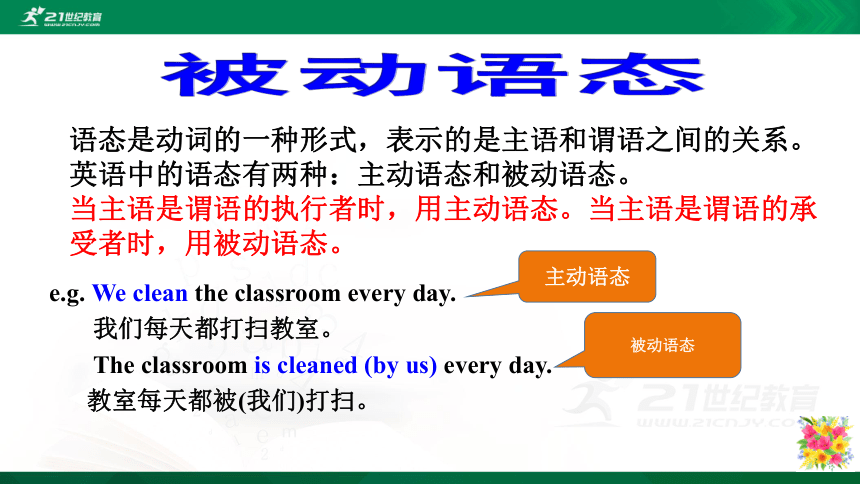
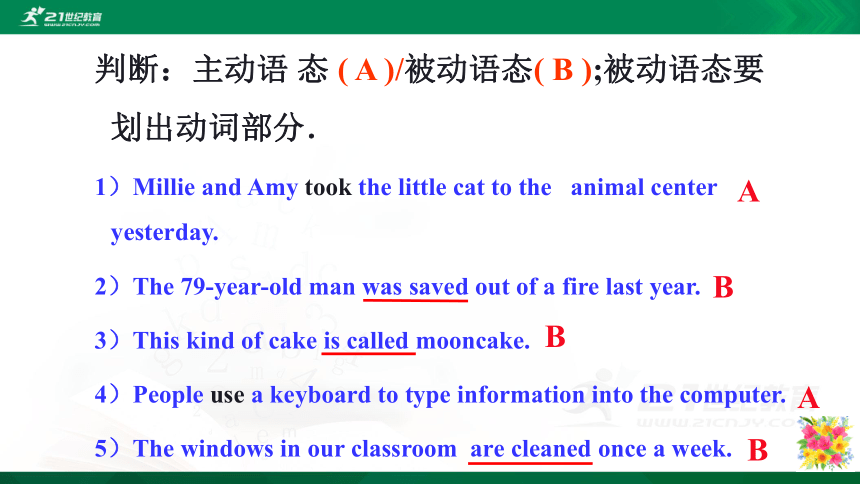
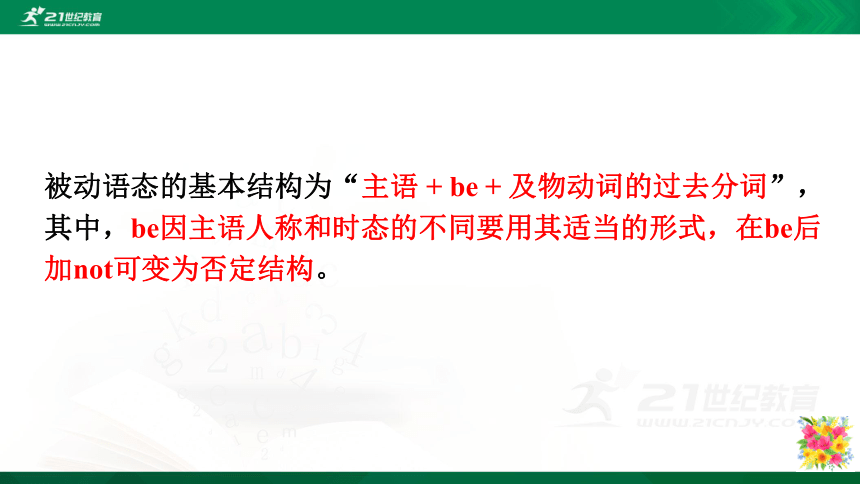

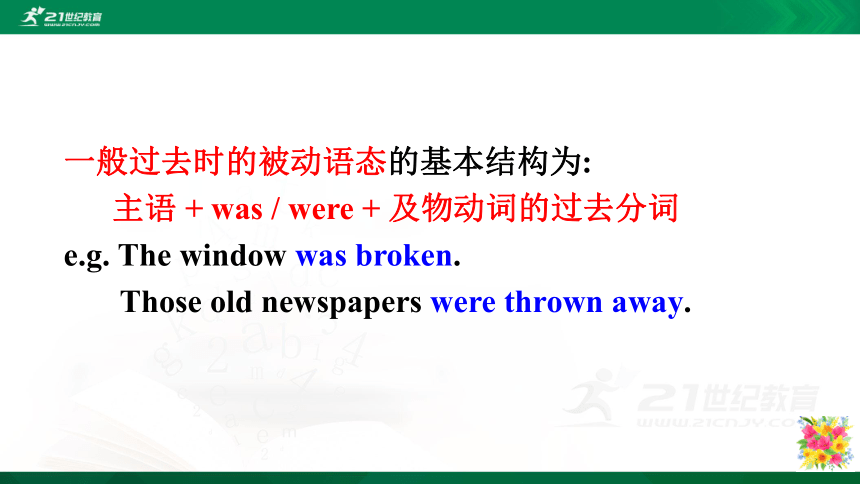

文档简介
(共48张PPT)
译林版·八年级下册
Unit 7 International charities
Grammar
学 习 目 标
1.掌握本课节新单词及短语:hold, set, hand out, set up
3.掌握并能正确运用被动语态的一般现在时和一般过去时。
2.了解使用被动语态的语境。
4.熟悉并能运用引出动作执行者的单词by。
It is used as a hospital. It is also used as a training centre.
Where do ORBIS doctors do operations
ORBIS doctors do operations on the plane.
奥比斯医生在飞机上动手术。
do active voice 主动语态
What is needed by ORBIS to help blind people
More money is needed by ORBIS to help blind people.
奥比斯需要更多的钱来帮助盲人。
is needed passive voice
被动语态
1. …, and about 80 per cent of these cases can be prevented and cured.
2. The plane is also used as a training center.
3. Also, local doctors and nurses are invited on board
to learn about eye operations.
4. …, 150 patients are operated on.
Translate the following sentence into Chinese.
语态是动词的一种形式,表示的是主语和谓语之间的关系。
英语中的语态有两种:主动语态和被动语态。
当主语是谓语的执行者时,用主动语态。当主语是谓语的承受者时,用被动语态。
被动语态
e.g. We clean the classroom every day.
我们每天都打扫教室。
The classroom is cleaned (by us) every day.
教室每天都被(我们)打扫。
主动语态
被动语态
判断:主动语 态 ( A )/被动语态( B );被动语态要划出动词部分.
1)Millie and Amy took the little cat to the animal center yesterday.
2)The 79-year-old man was saved out of a fire last year.
3)This kind of cake is called mooncake.
4)People use a keyboard to type information into the computer.
5)The windows in our classroom are cleaned once a week.
A
A
B
B
B
被动语态的基本结构为“主语 + be + 及物动词的过去分词”,其中,be因主语人称和时态的不同要用其适当的形式,在be后加not可变为否定结构。
一般现在时的被动语态的基本结构为
“主语 + is / am / are + 及物动词的过去分词”。
e.g. The little boy is looked after well in the kindergarten.
The streets are cleaned every day.
一般过去时的被动语态的基本结构为:
主语 + was / were + 及物动词的过去分词
e.g. The window was broken.
Those old newspapers were thrown away.
被动语态的一般疑问句形式是把be提到主语之前,其他成分语序不变,句末用问号。
e.g. Is your classroom cleaned every day
Was this house built last year
主语 be动词 过去分词
一般 现在 时 I am supported.
You/We/They are He/She/It is I am not supported.
You/We/They are not He/She/It is not Summary
主语 be动词 过去分词
一般 过去 时 I was not supported.
You/We/They were not He/She/It was not I was supported.
You/We/They were He/She/It was 1. The cake was eaten by Daniel.
2. Nancy bought a book yesterday.
3. The little dog is looked after very well by Simon.
4. He is reading English.
5. The computer is bought by my uncle.
6. I am woken up by my father everymorning.
Underline the passive voice in the following sentences.
None of the books was taken away.
没有一本书被拿走。
动作的执行者是泛指或者不言自明时。
被动语态的基本用法
The toy is designed for children.
在不知道动作的执行者是谁时。
这款玩具是为孩子们设计的。
需要强调动作的承受者时。
My bike was repaired.
我的自行车修好了。
The problem was talked about just now.
出于委婉或礼貌而避谈动作的执行者时。
这个问题刚才被讨论过。
Mr Wu is liked by all of his students.
所有的学生都喜欢吴老师。
在被动语态的句子中, 如果我们需要指出动作的执行者, 可以由by引出。
有些动词常用于被动语态。看以下例句
He was born in Nanjing. 他生于南京。
The mobile phone was made in China.
这部手机是中国制造的。
注意:
歌诀:谁做的动作不知道,
说出谁做的没必要。
被动语态的构成:be +v(p.p.)
一般现在时——
一般过去时——
am/is / are + v(p.p.)
was/were +v(p.p.)
Summary
被动语态还可用于某些习惯用语中,如“据说”、“据悉”、“有人说”、“大家说”、“出生于”等
e.g. He was born in Nanjing.
他出生在南京。
It is said that the 75-year-old man can still eat three
bowls of rice for lunch.
据说这位75岁的老人午餐还能吃三碗米饭。
注意:
主动语态转换为被动语态后,主动语态中的宾语也就是动作的承受者变成了被动语态的主语;主动语态的谓语结构变为被动语态的谓语结构“be + 及物动词的过去分词形式”。
主动语态中的主语,即动作的执行者之前加介词by,在被动语态中作状语。如果不需要强调动作的执行者时,这个状语可以省略。
主动语态 主语 She 谓语(主动式) hurt 宾语
me.
被动语态 原宾语(改为主格) I 谓语(被动式) was hurt by 原主语(改为宾格)
her.
主动语态和被动语态的句式转换
主动语态 主语 He 谓语(主动式) passed 间宾 me 直宾
a book.
被动语态 原直宾 A book 谓语(被动式) was passed to me by 原主语(改为宾格)him.
原间宾(改为主格) I 谓语(被动式) was passed 原直宾 a book by 原主语(改为宾格)
him.
主动+谓语+双宾语的句式转换
e.g. Mary feeds the dog three times a day.
→The dog is fed by Mary three times a day.
Our class set up the Music Club last year.
→The Music Club was set up (by our class) last year.
Did the policeman catch the thief
→Was the thief caught by the policeman
1. 有些动词, 其主动语态形式含有被动意义。如: 系动词smell, taste, sound, feel 等。
e.g. The dish smells good.
这道菜闻起来很香。
The music sounds nice.
这段音乐听起来不错。
注意:
还有一些不及物动词, 常用主动语态, 和well, easily等副词连用, 含有被动意义。如: read, write, draw, sell, wash, cook, clean 等。
e.g. The books sell well. 这些书很畅销。
The pen writes smoothly.
这支笔写起来很顺滑。
2. 在感官动词和使役动词的主动语态句式中, 动词不定式的to常省去,
但是在被动 语态中要加上to。
主动语态 主语 The teacher 谓语(主动式) made 宾语 him 不带to的不定式
retell the story.
被动语态 原宾语(改为主格) He 谓语(被动式) was made 带to的不定式 to retell the story by 原主语(改为宾格)
the teacher.
主动语态变被动语态的口诀
宾变主,主变宾,by短语后面跟。
谓语动词变被动,be后“过分”来使用。
“be”要随着主语变,人称时态要弄准。
把主动语态变为被动语态:
1.People grow rice in many parts of China.
2. She held a charity show yesterday.
Rice is grown by people in many parts of China.
A charity show was held by her yesterday.
3.People usually send Christmas cards in December.
4. We bought some computers last week.
Christmas cards are usually sent by people in December.
Some computers were bought by us last week.
The Class 1, Grade 8 students are talking about the different things people can do for the poor. Look at the pictures and help them complete their notes using the words in brackets and the passive voice. Add the word by when necessary.
Helping others
What they do every year
1. Charity activities _________________________ (plan/to help the poor).
are planned to help the poor
Leaflets _______________________ ___________________________ (hand out/to people in the street/ volunteers).
are handed out to people
in the street by volunteers
Toys and CDs _____________________
(sell/to raise money).
are sold to raise money
What they did last week
New books _________________________ __________________________________ (send/to children in poor areas/the Class 1, Grade 8 students).
were sent to children in poor
areas by the Class 1, Grade 8 students
Warm clothes __________________________ (collect/for poor people).
were collected for poor people
A charity show _____________________________ (hold/the Students’ Union).
was held by the Students’ Union
B Amy and Daniel are talking about plete their conversation with the words in brackets using the passive voice.
Amy: I’m reading a book about Oxfam.
Daniel: Really Please tell me about it.
Amy: OK. Oxfam ___________ (set up) in the UK in 1942, and the first Oxfam shop ___________ (open) in 1948. Now it has about 15,000 shops all over the world. A lot of things _________ (sell) in Oxfam shops, including books. The money _______ (use) by Oxfam to help poor people.
Daniel: That’s good. There are also some charity projects in China. One of them ________ (call) Project Hope. It ____________ (start) in 1989. With its help, millions of poor children all over the country __________ (give) basic education.
Amy: Yea. Many schools __________ (build) in poor areas each year.
was set up
was opened
are sold
is used
is called
was started
were given
are built
用动词的被动语态填空:
English ____________(speak) by many people.
The trees _______________(plant) by them.
That building _________(build) two years ago.
This kind of computer ________(make) in China.
The games __________(sell) in may shops.
is spoken
were planted
was built
is made
are sold
用括号内所给动词的正确形式填空
1.It's said(据说) that the long bridge______________(build)two months ago.
2.Which language _______the most widely_______(speak)in the world?
3.Last year a large number of trees______________(cut)down.
4. Vegetables, eggs and fruits_________ (sell) in this shop.
5. The room _____________ (clean) by me every day.
6. This kind of shoes __________ (sell) well.
7. The food _____________ (smell) delicious.
8. Look! Someone __________(dance).
was built
is spoken
Were cut
are sold
is cleaned
sells
smells
is dancing
Exercises
把下列句子改成被动语态:
1. They helped the poor child last week.
2. We collect warm clothes for the poor people.
3. My parents give me a birthday present every year.
4. She often takes care of the little girl.
5. He made me do that.
6. I often see him sing songs in the park.
The poor child was helped by them last week.
Warm clothes are collected for the poor people by us.
I am given a birthday present by my parents every year.
A birthday present is given to me by my parents every year.
The little girl is often taken care of by her.
I was made to do that by him.
He is often seen to sing songs in the park by me.
Homework
1.Remember the new words and phrases .
2.Finish the exercises on the students’ books.
谢谢
21世纪教育网(www.21cnjy.com)
中小学教育资源网站
兼职招聘:
https://www.21cnjy.com/recruitment/home/admin
译林版·八年级下册
Unit 7 International charities
Grammar
学 习 目 标
1.掌握本课节新单词及短语:hold, set, hand out, set up
3.掌握并能正确运用被动语态的一般现在时和一般过去时。
2.了解使用被动语态的语境。
4.熟悉并能运用引出动作执行者的单词by。
It is used as a hospital. It is also used as a training centre.
Where do ORBIS doctors do operations
ORBIS doctors do operations on the plane.
奥比斯医生在飞机上动手术。
do active voice 主动语态
What is needed by ORBIS to help blind people
More money is needed by ORBIS to help blind people.
奥比斯需要更多的钱来帮助盲人。
is needed passive voice
被动语态
1. …, and about 80 per cent of these cases can be prevented and cured.
2. The plane is also used as a training center.
3. Also, local doctors and nurses are invited on board
to learn about eye operations.
4. …, 150 patients are operated on.
Translate the following sentence into Chinese.
语态是动词的一种形式,表示的是主语和谓语之间的关系。
英语中的语态有两种:主动语态和被动语态。
当主语是谓语的执行者时,用主动语态。当主语是谓语的承受者时,用被动语态。
被动语态
e.g. We clean the classroom every day.
我们每天都打扫教室。
The classroom is cleaned (by us) every day.
教室每天都被(我们)打扫。
主动语态
被动语态
判断:主动语 态 ( A )/被动语态( B );被动语态要划出动词部分.
1)Millie and Amy took the little cat to the animal center yesterday.
2)The 79-year-old man was saved out of a fire last year.
3)This kind of cake is called mooncake.
4)People use a keyboard to type information into the computer.
5)The windows in our classroom are cleaned once a week.
A
A
B
B
B
被动语态的基本结构为“主语 + be + 及物动词的过去分词”,其中,be因主语人称和时态的不同要用其适当的形式,在be后加not可变为否定结构。
一般现在时的被动语态的基本结构为
“主语 + is / am / are + 及物动词的过去分词”。
e.g. The little boy is looked after well in the kindergarten.
The streets are cleaned every day.
一般过去时的被动语态的基本结构为:
主语 + was / were + 及物动词的过去分词
e.g. The window was broken.
Those old newspapers were thrown away.
被动语态的一般疑问句形式是把be提到主语之前,其他成分语序不变,句末用问号。
e.g. Is your classroom cleaned every day
Was this house built last year
主语 be动词 过去分词
一般 现在 时 I am supported.
You/We/They are He/She/It is I am not supported.
You/We/They are not He/She/It is not Summary
主语 be动词 过去分词
一般 过去 时 I was not supported.
You/We/They were not He/She/It was not I was supported.
You/We/They were He/She/It was 1. The cake was eaten by Daniel.
2. Nancy bought a book yesterday.
3. The little dog is looked after very well by Simon.
4. He is reading English.
5. The computer is bought by my uncle.
6. I am woken up by my father everymorning.
Underline the passive voice in the following sentences.
None of the books was taken away.
没有一本书被拿走。
动作的执行者是泛指或者不言自明时。
被动语态的基本用法
The toy is designed for children.
在不知道动作的执行者是谁时。
这款玩具是为孩子们设计的。
需要强调动作的承受者时。
My bike was repaired.
我的自行车修好了。
The problem was talked about just now.
出于委婉或礼貌而避谈动作的执行者时。
这个问题刚才被讨论过。
Mr Wu is liked by all of his students.
所有的学生都喜欢吴老师。
在被动语态的句子中, 如果我们需要指出动作的执行者, 可以由by引出。
有些动词常用于被动语态。看以下例句
He was born in Nanjing. 他生于南京。
The mobile phone was made in China.
这部手机是中国制造的。
注意:
歌诀:谁做的动作不知道,
说出谁做的没必要。
被动语态的构成:be +v(p.p.)
一般现在时——
一般过去时——
am/is / are + v(p.p.)
was/were +v(p.p.)
Summary
被动语态还可用于某些习惯用语中,如“据说”、“据悉”、“有人说”、“大家说”、“出生于”等
e.g. He was born in Nanjing.
他出生在南京。
It is said that the 75-year-old man can still eat three
bowls of rice for lunch.
据说这位75岁的老人午餐还能吃三碗米饭。
注意:
主动语态转换为被动语态后,主动语态中的宾语也就是动作的承受者变成了被动语态的主语;主动语态的谓语结构变为被动语态的谓语结构“be + 及物动词的过去分词形式”。
主动语态中的主语,即动作的执行者之前加介词by,在被动语态中作状语。如果不需要强调动作的执行者时,这个状语可以省略。
主动语态 主语 She 谓语(主动式) hurt 宾语
me.
被动语态 原宾语(改为主格) I 谓语(被动式) was hurt by 原主语(改为宾格)
her.
主动语态和被动语态的句式转换
主动语态 主语 He 谓语(主动式) passed 间宾 me 直宾
a book.
被动语态 原直宾 A book 谓语(被动式) was passed to me by 原主语(改为宾格)him.
原间宾(改为主格) I 谓语(被动式) was passed 原直宾 a book by 原主语(改为宾格)
him.
主动+谓语+双宾语的句式转换
e.g. Mary feeds the dog three times a day.
→The dog is fed by Mary three times a day.
Our class set up the Music Club last year.
→The Music Club was set up (by our class) last year.
Did the policeman catch the thief
→Was the thief caught by the policeman
1. 有些动词, 其主动语态形式含有被动意义。如: 系动词smell, taste, sound, feel 等。
e.g. The dish smells good.
这道菜闻起来很香。
The music sounds nice.
这段音乐听起来不错。
注意:
还有一些不及物动词, 常用主动语态, 和well, easily等副词连用, 含有被动意义。如: read, write, draw, sell, wash, cook, clean 等。
e.g. The books sell well. 这些书很畅销。
The pen writes smoothly.
这支笔写起来很顺滑。
2. 在感官动词和使役动词的主动语态句式中, 动词不定式的to常省去,
但是在被动 语态中要加上to。
主动语态 主语 The teacher 谓语(主动式) made 宾语 him 不带to的不定式
retell the story.
被动语态 原宾语(改为主格) He 谓语(被动式) was made 带to的不定式 to retell the story by 原主语(改为宾格)
the teacher.
主动语态变被动语态的口诀
宾变主,主变宾,by短语后面跟。
谓语动词变被动,be后“过分”来使用。
“be”要随着主语变,人称时态要弄准。
把主动语态变为被动语态:
1.People grow rice in many parts of China.
2. She held a charity show yesterday.
Rice is grown by people in many parts of China.
A charity show was held by her yesterday.
3.People usually send Christmas cards in December.
4. We bought some computers last week.
Christmas cards are usually sent by people in December.
Some computers were bought by us last week.
The Class 1, Grade 8 students are talking about the different things people can do for the poor. Look at the pictures and help them complete their notes using the words in brackets and the passive voice. Add the word by when necessary.
Helping others
What they do every year
1. Charity activities _________________________ (plan/to help the poor).
are planned to help the poor
Leaflets _______________________ ___________________________ (hand out/to people in the street/ volunteers).
are handed out to people
in the street by volunteers
Toys and CDs _____________________
(sell/to raise money).
are sold to raise money
What they did last week
New books _________________________ __________________________________ (send/to children in poor areas/the Class 1, Grade 8 students).
were sent to children in poor
areas by the Class 1, Grade 8 students
Warm clothes __________________________ (collect/for poor people).
were collected for poor people
A charity show _____________________________ (hold/the Students’ Union).
was held by the Students’ Union
B Amy and Daniel are talking about plete their conversation with the words in brackets using the passive voice.
Amy: I’m reading a book about Oxfam.
Daniel: Really Please tell me about it.
Amy: OK. Oxfam ___________ (set up) in the UK in 1942, and the first Oxfam shop ___________ (open) in 1948. Now it has about 15,000 shops all over the world. A lot of things _________ (sell) in Oxfam shops, including books. The money _______ (use) by Oxfam to help poor people.
Daniel: That’s good. There are also some charity projects in China. One of them ________ (call) Project Hope. It ____________ (start) in 1989. With its help, millions of poor children all over the country __________ (give) basic education.
Amy: Yea. Many schools __________ (build) in poor areas each year.
was set up
was opened
are sold
is used
is called
was started
were given
are built
用动词的被动语态填空:
English ____________(speak) by many people.
The trees _______________(plant) by them.
That building _________(build) two years ago.
This kind of computer ________(make) in China.
The games __________(sell) in may shops.
is spoken
were planted
was built
is made
are sold
用括号内所给动词的正确形式填空
1.It's said(据说) that the long bridge______________(build)two months ago.
2.Which language _______the most widely_______(speak)in the world?
3.Last year a large number of trees______________(cut)down.
4. Vegetables, eggs and fruits_________ (sell) in this shop.
5. The room _____________ (clean) by me every day.
6. This kind of shoes __________ (sell) well.
7. The food _____________ (smell) delicious.
8. Look! Someone __________(dance).
was built
is spoken
Were cut
are sold
is cleaned
sells
smells
is dancing
Exercises
把下列句子改成被动语态:
1. They helped the poor child last week.
2. We collect warm clothes for the poor people.
3. My parents give me a birthday present every year.
4. She often takes care of the little girl.
5. He made me do that.
6. I often see him sing songs in the park.
The poor child was helped by them last week.
Warm clothes are collected for the poor people by us.
I am given a birthday present by my parents every year.
A birthday present is given to me by my parents every year.
The little girl is often taken care of by her.
I was made to do that by him.
He is often seen to sing songs in the park by me.
Homework
1.Remember the new words and phrases .
2.Finish the exercises on the students’ books.
谢谢
21世纪教育网(www.21cnjy.com)
中小学教育资源网站
兼职招聘:
https://www.21cnjy.com/recruitment/home/admin
